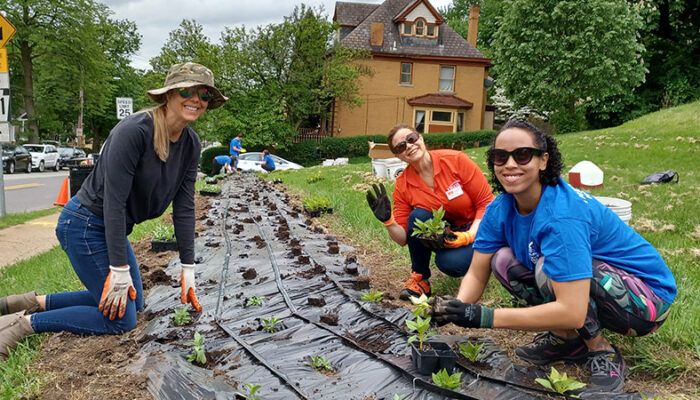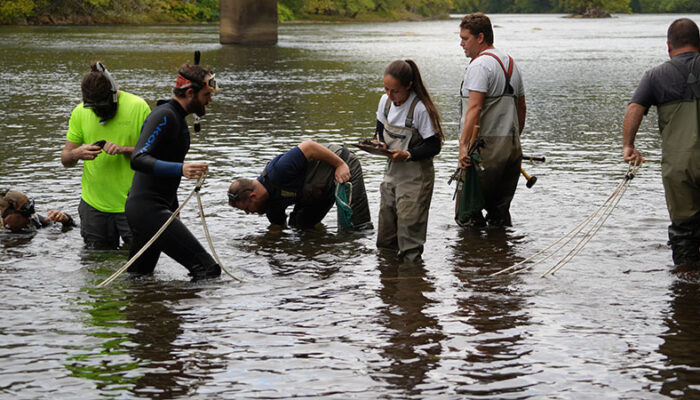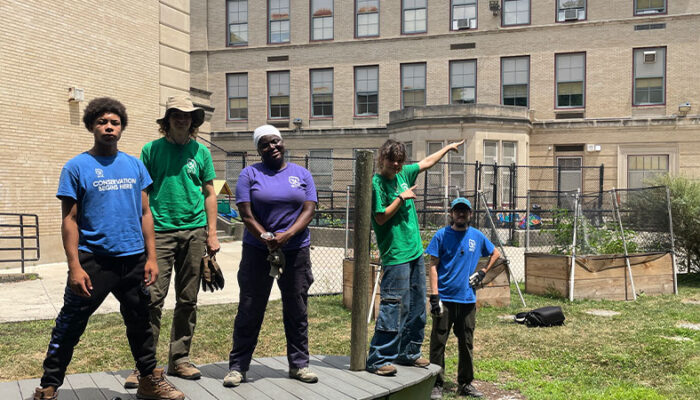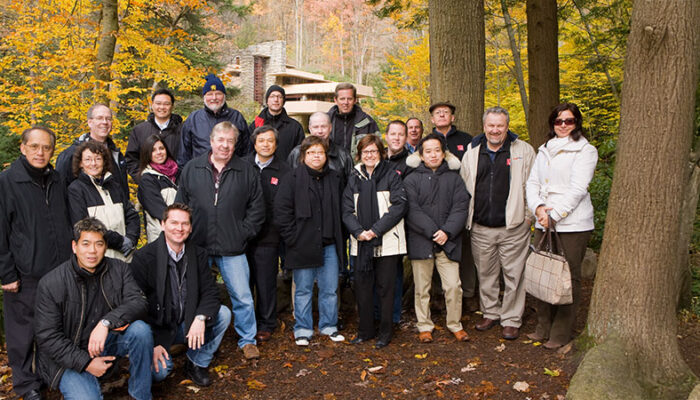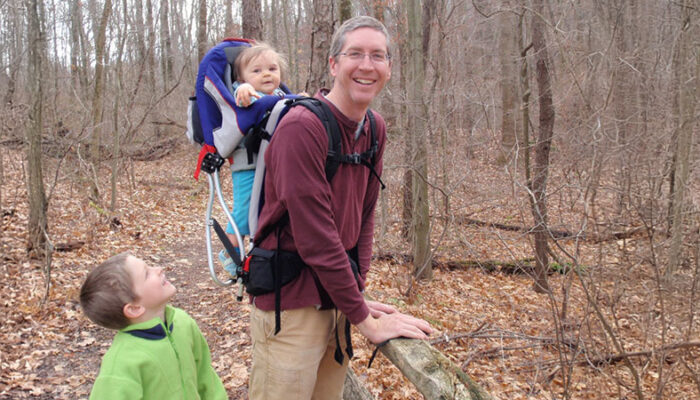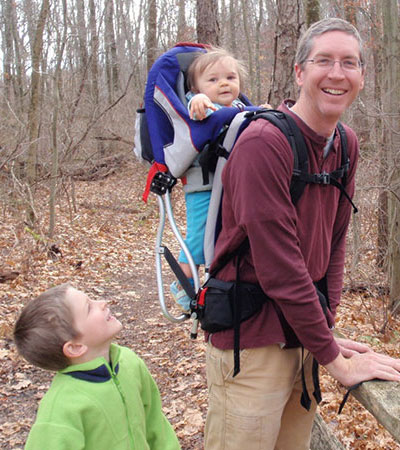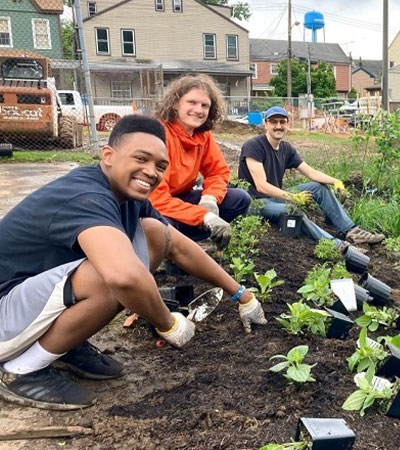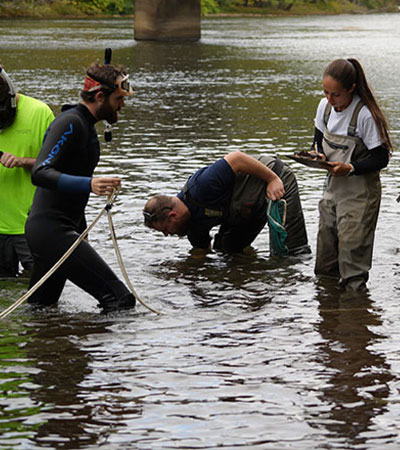Andy Zadnik
There’s a lot to enjoy about spending a portion of one’s work hours out in nature, says Andy Zadnik, WPC’s senior director of land stewardship. However, he points out with a laugh, “I don’t just frolic in the woods all day. If only!” He leads a group of land stewards, along with several dedicated volunteers, who monitor and manage WPC’s preserves and conservation easements.
Beautiful vistas, the smell of autumn leaves and cute critter encounters aside, the permanency of the work is its greatest reward. “Knowing that something I had a part in – like planting trees, removing old structures or building a hiking trail – will benefit the natural environment and people who care about that for many, many years” provides his greatest workplace satisfaction, says Andy, who has worked for WPC since 2007.
“When I plant a tree, it might still be around for hundreds of years! That blows my mind.”
Andy tries to ensure that every land stewardship project helps meet WPC’s core mission of protecting important places for future generations. For inspiration, he looks no further than his office walls, decorated with pictures of his kids and artwork from their grade school days.
“It reminds me why I do what I do,” he says. “I hope that someday they’ll visit the areas where I worked, and maybe bring their kids along. It’ll be nice if I’m still around, too.”
Annette Pannebaker
Fallingwater Volunteer Annette Pannebaker lives in Altoona, but loves Fallingwater so much that she drives more than two hours each way to volunteer! That’s saying a lot, especially for someone who considers herself a “homebody.” Annette, who goes by Wiya, helps with greeting, wayfinding, taking photos of visitors and answering questions. Read more about her passion for Fallingwater and architecture.
Became a volunteer in 2022
How did you become involved with Fallingwater and what motivates you to stay involved?
I fell in love with Fallingwater when I was 12 years old, when my dad and mom took me there for a visit in 1972. I remember laying my hand on the water inside the house and it was so magical. The blend of nature inside your living space just blew my mind. Since then it has molded my tastes and love of architecture. I have recently restored a home as close as possible, with Frank’s philosophy in mind, 53 years later.
What has been most challenging or rewarding about volunteering?
I have to drive more than two hours one way, but it’s worth it.
Tell us about your favorite volunteer experience.
Meeting people from all around the world.
What is your career?
I have worked for the State of Pennsylvania in Probation and Parole for 25 years.
What do you do when you’re not volunteering at Fallingwater?
Study house design, spend time with my three grandchildren and work on my house. I love to cook for my family on Sundays with big family meals.
What might we be surprised to know about you?
I am a homebody. I love being home and creating an atmosphere that is quiet and comforting to all.
Donna Morrison
Conservancy member and volunteer Donna Morrison, of Greensburg, Pa., became a member in 2003 after learning about WPC through friends, but her love for nature goes back to her childhood. One of her favorite memories of being in nature, she says, was “Collecting leaves for a science project in grade school and enjoying the fall foliage in Schenley Park in Pittsburgh with my father and sister.” It’s no surprise, then, that WPC’s work in land stewardship and community forestry resonate with her.
What are some conservation issues that interest or concern you?
Climate Change, Invasive Species, Watershed Restoration, Preservation of Fallingwater, Pollinator Support and Urban Tree Canopy
What is your career?
Retired administrator, Saint Vincent College, Latrobe, Pa; Director of Career Services and Internships, 31 years.
What motivates you to stay involved?
We believe in the work that WPC does and the overall benefit to this region.
What would tell a friend or colleague about why you are a WPC Member?
Saving the places that we care about. If you enjoy the beauty of the outdoors and nature, and historical preservation, contribute to their existence and future.
What other active measures do you take to support conservation or WPC’s work?
My husband, Harry, and I write thank you postcards to donors of Fallingwater and WPC. We had been involved for a number of years with staff in performing office work in the Pittsburgh office on Washington’s Landing, reconciling land acquisition documents, etc. with digital information for purposes of accreditation.
What might we be surprised to know about you?
My other volunteer activities have been serving as an office assistant at the Westmoreland Yough Trail Chapter, part of the Great Allegheny Passage (GAP), and have been their webmaster since 2015. My husband and I enjoy riding our bikes along the GAP, at West Newton and Cedar Creek Park.
Hannah Huber
Imagine being so passionate, so driven, so completely wild about mushrooms that you’d follow this advice: “You should give up whatever job you have and just quit. Just stop now, and devote the rest of your life to mushrooms.” Ironically, that message, touted often by Pittsburgh mycologist Gary Lincoff (1942 – 2018), led Hannah Huber to a job studying mushrooms.
Since 2023, Hannah has served with the Conservancy as a conservation mycologist, or scientist who studies fungi, with the Pennsylvania Natural Heritage Program. She is Pennsylvania’s first official state mycologist.
Thousands of fungal species grow in Pennsylvania, but no one knows yet exactly how many, says Hannah, noting that new species are discovered every year by academics and community mycologists alike. In addition to performing other important roles, fungi are the ultimate recyclers, breaking down organic matter to create fertile soil that plants and trees use.
The most challenging part of her job isn’t tramping around in soggy forests, but rather “getting a handle on the sheer diversity of fungi in Pennsylvania,” she says. She curates the list of fungal species—native or introduced mushrooms, lichens, truffles, microscopic fungi—and assesses the conservation status of species that appear to be rare. She’s also working on a fungal inventory project in old- growth forest patches on state forest land.
Historically, mushrooms have been dismissed and somewhat disrespected. “Until 1969, fungi were relegated as ‘lesser plants.’ Even still most academic institutions don’t have mycology-focused degree programs,” Hannah notes. Her own academic background is a bachelor of science, Integrative Studies in Biology & Environmental Science MPS Applied Ecology.
“In field mycology, most experts are not academically trained,” she says. The good news? Passionate people in mycology clubs participate in community science projects that generate data on which Hannah and other mycologists can rely!
Whether you’re interested in a career in mycology or just find fungi fun and fascinating and want to make a difference to support our natural world, Hannah says, “Join a mushroom club (or several!) and attend walks and forays! Learn how to recognize rare species. Find mentors and learn the funga of your region and continually monitor their populations.”
Harry Morrison
Harry Morrison, a longtime Conservancy member and volunteer from Greensburg, Pa., says his love of the outdoors led to his involvement with WPC. Climate change, water quality and the importance of urban tree canopy are just some issues that drive his interest in and support of WPC’s land stewardship and community forestry work as well as efforts to preserve Fallingwater.
Became a Member/Donor in 2003
What is your career?
For the first half of my career, I worked in research and development for two local corporations. I then joined the faculty of a small college and taught computer science and mathematics for two-plus decades.
How did you learn about WPC?
I have participated in outdoor activities and cycling for most of my life. People I met through those interests introduced me to WPC.
What motivates you to stay involved?
Over the years I have become acquainted with a number of members of the WPC staff. I deeply believe in the work they are doing and want to continue to support that work to the extent I can.
What other active measures do you take to support conservation or WPC’s work?
I have volunteered as a land steward and at Waterfront Drive (WPC’s headquarters) for many years.
What might we be surprised to know about you?
I taught at the American School in Alexandria Egypt in 1973-74.
Jay Silberblatt
When Fallingwater Volunteer Jay Silberblatt arrives at Bear Run Nature Reserve for his shift, he leaves behind the hustle and bustle of Pittsburgh. “At Fallingwater, the outside world never intrudes,” says Jay, who has volunteered since 2024. “I do not get good cell service there, so my day is never interrupted with calls, texts or emails.” Instead, he enjoys chatting with visitors from around the world about their Fallingwater experience.”
How did you become involved with Fallingwater and what motivates you to stay involved?
I have been a member for many years. I have also had a longstanding interest in the architecture of Frank Lloyd Wright. My wife and I have visited Wright-designed creations all over the country. As I wound down my 45-year career as a trial lawyer, spending time at Fallingwater seemed like a natural thing to do.
What has been most challenging or rewarding about volunteering?
When I come to Fallingwater, I like to be outside. The cold and the rain can sometimes be a challenge. Observing the house from every different angle and vantage point, and talking with visitors about its design and the Kaufmann family is always the highpoint of a day at Fallingwater. When at Fallingwater, the outside world never intrudes. I do not get good cell service there, so my day is never interrupted with calls, texts or emails.
Tell us about your favorite volunteer experience:
I enjoy spending time at “The View” and chatting with visitors from around the world after they have finished their tour of the house. A few weeks ago, I spent time with a 93-year-old gentleman from Kentucky who was visiting with his family. It turned out that he grew up in a house just a few blocks away from where I live now. Coincidentally, the day before, while visiting his boyhood home, he chatted with my wife while she was walking our dog.
What advice do you have for someone who is considering volunteering?
Just do it; you will find peace and enjoyment.
What is your career?
I have had a 45-year career as a civil trial lawyer.
What do you do when you’re not volunteering at Fallingwater?
I still work as a mediator and remain active in the Pennsylvania Bar Association. I travel, and spend time with my children.
What might we be surprised to know about you?
I have visited more than 25 Wright-designed houses and buildings, as well several houses in Oak Park, Illinois, the campus of Florida Southern College in Lakeland, Florida, and the Burnham Block in Milwaukee, Wisconsin.
John A. Straitiff
As executive director of the PA Great Outdoors Visitors Bureau, John A. Straitiff is a natural fit for WPC’s Ridgway Regional Advisory Committee. John joined the committee in 2015 to honor the memory of his friend and WPC board member Dr. Colson Blakeslee.
What parts of WPC’s work resonate with you?
Land Conservation, Land Stewardship and Watershed Conservation
What are some conservation issues that interest or concern you?
Habitat Loss, Watershed Restoration, Endangered or Threatened Species, Invasive Species, Land Development and Forest Connectivity
How did you become involved with WPC and what motivates you to stay involved?
My friend Dr. Colson Blakeslee was a WPC board member. He spoke very highly and passionately about the Conservancy’s work. I went to the dedication of the memorial recreation area in Medix Run and Matt Marusiak, WPC director of land protection, asked me to join the advisory committee. I proudly stay involved to honor Dr. Blakeslee’s memory.
Tell us about a favorite nature experience or memory.
The first time I saw a wild bull elk in Pennsylvania is a memory that I treasure.
What other active measures do you take to support conservation or WPC’s work?
I promote WPC owned properties and projects in the region via my weekly blog and social media posts.
What might we be surprised to know about you?
I help coach an adult special needs softball team in DuBois Challenger League.
Kate Wehler
As district manager for the Elk County Conservation District, Kate Wehler, a member of WPC’s Ridgway Regional Advisory Committee, says her job dovetails perfectly with this volunteer effort. WPC and the ECCD “have a lot in common in our missions and in our passions for conservation,” she says. “This shared drive often brings us together.” Kate, who joined our advisory committee in 2019, started her career in conservation at the ECCD right out of college in 2014.
What parts of WPC’s work resonate with you?
Community Forestry, Land Conservation, Land Stewardship, Watershed Conservation and Conservation Science
What are some conservation issues that interest or concern you?
Climate Change, Watershed Restoration, Endangered or Threatened Species, Pollinator Support, Invasive Species, Land Development and Biodiversity
How did you become involved with WPC and what motivates you to stay involved?
In Elk County, we are served by two different watershed offices: Allegheny Regional Office in Ridgway and the Watershed Conservation Office in Indiana. The Elk County Conservation District has an excellent working relationship with both of these offices going back decades. We have a lot in common in our missions and in our passions for conservation. This shared drive often brings us together.
Tell us about a favorite nature experience or memory.
My dad really kickstarted my journey towards conservation. I grew up in a pretty outdoorsy family. I have a memory of being with my dad in the woods and we came upon some trash. My dad picked it up and carried it out with us. As he was doing so, he was complaining about people and their lack of respect and appreciation for our environment. After that, I always wanted to be part of the solution. I cared about the environment and I wanted to make others care as well.
What other active measures do you take to support conservation or WPC’s work?
Our team at the ECCD regularly writes letters of support for WPC’s grant proposals, helps to tag-team funding opportunities and will physically help with projects.
What might we be surprised to know about you?
I’m a pretty open book, so there’s likely not much that is a mystery about me. But a favorite hobby of mine is reading. I have a goal to read a book a week in 2025. Currently (in October/November) I’m about two weeks behind, but I can still make it!
Marah Fielden
Throughout her childhood and teen years, Marah Fielden spent happy weekends hiking, hunting and exploring the woods at her family’s camp. “My dad taught me which plants were good for foraging and habitat,” she recalls. “I became familiar with different species of trees and signs of a healthy forest.” Now a certified ISA Certified Arborist and WPC’s director of community greening projects, Marah says those experiences led her to a career in conservation.
She recognizes that not everyone can access nature as easily as they would like. “Experiencing greenery around you is so healing for the mind and body,” Marah says. “Everyone deserves to have access to green spaces. Our team brings nature to city centers, where the people are.”
Marah has served in four roles in two departments since starting at WPC in 2013. She loves that her greening team works alongside community members, providing expertise to help people accomplish their vision. “The people I work with are wonderful,” she says. “Together we plant trees in parks or along residential streets, plant and maintain community flower gardens, install outdoor classrooms for early childhood students and more.”
In addition to field work, Marah writes grants and fundraises, enabling her to advocate for more tree plantings, flower gardens and outdoor classrooms for kids.
When building momentum for community greening work, it a challenge to solicit and hear all opinions, she says. “It’s inspiring when we all have the same vision and work together on solutions, when we make sure everyone’s voice is heard and needs are met to the best of our abilities.”
Now, as a parent of twins, Marah says it’s important to leave the world a better place than when she entered it, and introduces her children to nature as her dad did with her. “I spend most evenings taking my kids outside so they can experience nature and all the plants and critters in it,” she says. “My daughter is three, and knows the names of more birds and plants than many adults I know. This is a win!”
Learn more about Marah and her work in this clip from our webinar, “The View From Here: Five Women Discuss Careers in Conservation & Preservation.“

